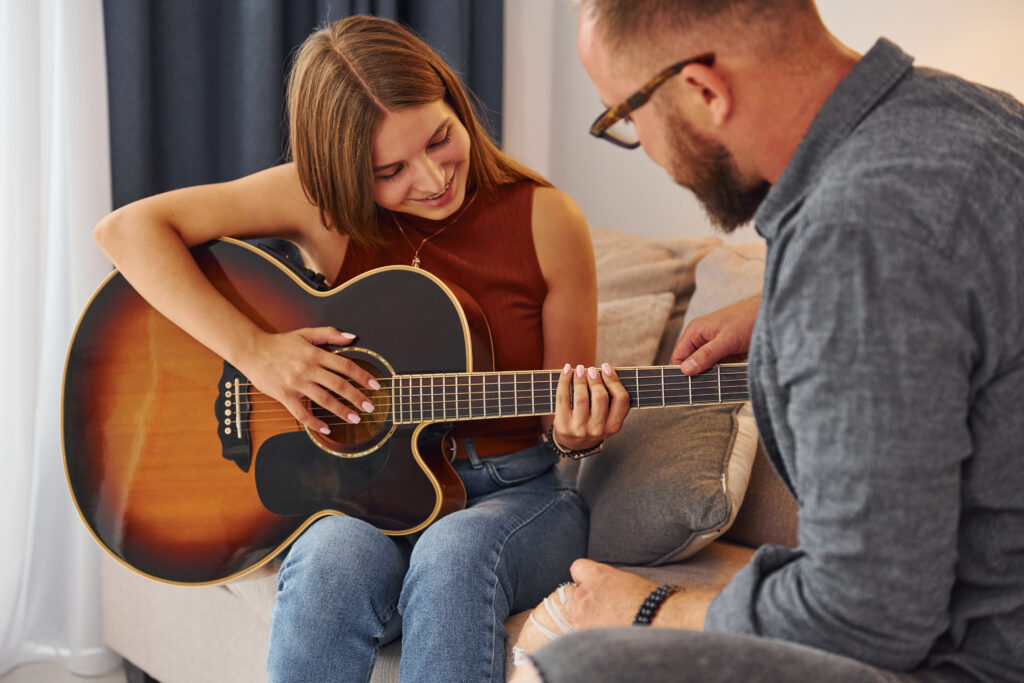Playing music in a group offers numerous opportunities, both musical and personal.
Here are 7 benefits of playing music in a group:
1. Accelerated Growth in Skill: Playing music with others allows you to improve your musicianship. You’ll learn to listen more attentively, follow other musicians’ cues, and adapt to different playing styles. Group settings provide opportunities for collaboration, which can expand your musical repertoire and help you master new techniques.
2. Improved Timing and Rhythm: Playing music in a group helps develop a strong sense of timing and rhythm. It requires you to synchronize your playing with other musicians, fostering a tight and cohesive sound. Regular practice in a group setting can significantly enhance your overall rhythmic abilities.
3. Increased Social Interaction: Music brings people together, and playing in a group encourages social interaction. You’ll develop friendships and a sense of camaraderie with fellow musicians, leading to a supportive and enjoyable environment. Group rehearsals and performances provide opportunities to connect with like-minded individuals who share the same passion for music.

4. Heightened Communication Skills: Playing music in a group demands effective communication. Musicians must convey musical ideas, dynamics, and nuances to create a cohesive performance. By actively listening, interpreting, and responding to other musicians, you’ll enhance your communication skills both within the musical context and in general interactions.
5. Enhanced Listening Abilities: Group playing hones your listening skills as you focus on blending your sound with others. You’ll develop a better ear for harmony, melody, and tonal balance. Listening critically to the entire ensemble while maintaining your part helps train your ears and improves your overall musical perception.
6. Exposure to Different Styles and Genres: Joining a music group exposes you to various types and categories of artistic expression. Collaborating with diverse musicians broadens your musical horizons, expands your capabilites, and allows you to explore different musical traditions. It encourages you to step outside your comfort zone and embrace new musical experiences.

7. Performance Opportunities: Playing music in a group opens the door to performing live in front of an audience. This experience can boost your confidence, stage presence, and performance skills. Sharing your music with others evokes a sense of fulfillment and accomplishment, and it provides a platform to showcase your talent.
Remember, these benefits can apply to various types of music groups, such as bands, orchestras, choirs, jazz ensembles, and chamber groups. The specific advantages may vary depending on the musical setting and the dynamics within the group.
How Does Music Help You Connect With Others?
Music has a remarkable ability to connect people in various ways. It facilitates emotional expression, creating a platform for shared experiences and understanding. Through music, individuals can connect on an emotional level, resonating with the same feelings and fostering empathy.
Music also plays a role in shaping cultural and personal identities, allowing for appreciation of diverse backgrounds and experiences. Collaborative “music-making” requires cooperation and communication, strengthening interpersonal connections and encouraging teamwork. By engaging in music-related activities, people can form new friendships and social bonds, finding a sense of belonging and community. Furthermore, music serves as a non-verbal form of communication, bridging language barriers and enabling meaningful interactions.

It also has therapeutic qualities, offering healing and support, and providing solace during difficult times.
Is it Important to Listen to Music With Other People?
Listening to music with others can be a valuable and enriching experience. It allows for shared enjoyment and creates opportunities to connect with friends, family, or a larger community over shared musical interests.
Whether it’s discovering new music together, attending live performances, or simply bonding over conversations about songs and memories, the social aspect of listening to music can strengthen relationships and foster a sense of togetherness. Music has the power to evoke emotions and listening with others can deepen the emotional connection, promoting empathy and understanding.
However, personal preferences also play a role, as some individuals may prefer solitary listening for personal relaxation or self-expression. Ultimately, the importance of listening to music with others depends on the desire for shared experiences, social bonding, and the enjoyment derived from connecting through music.







